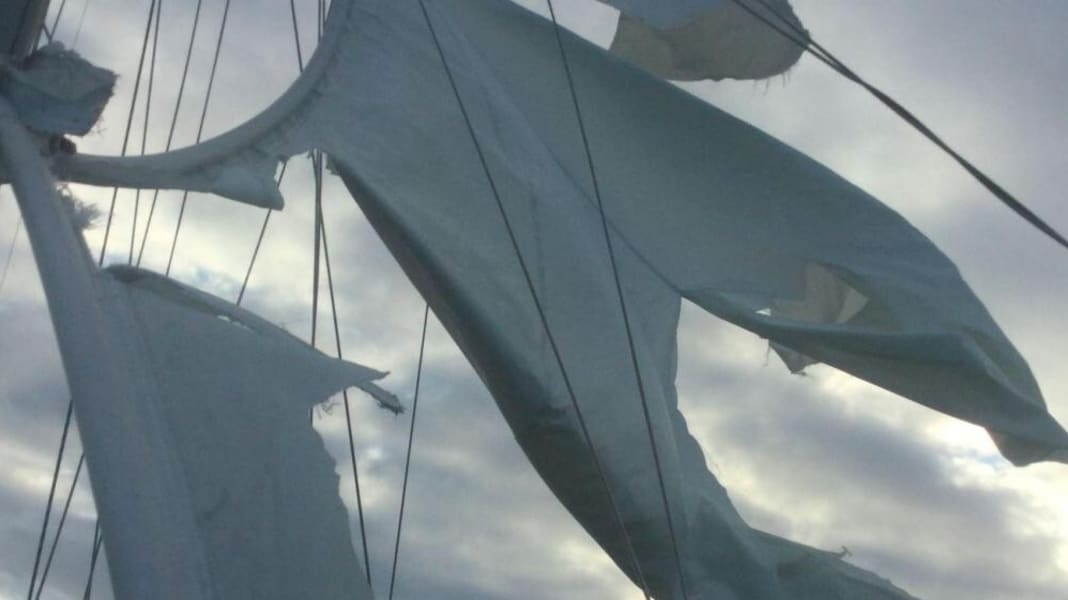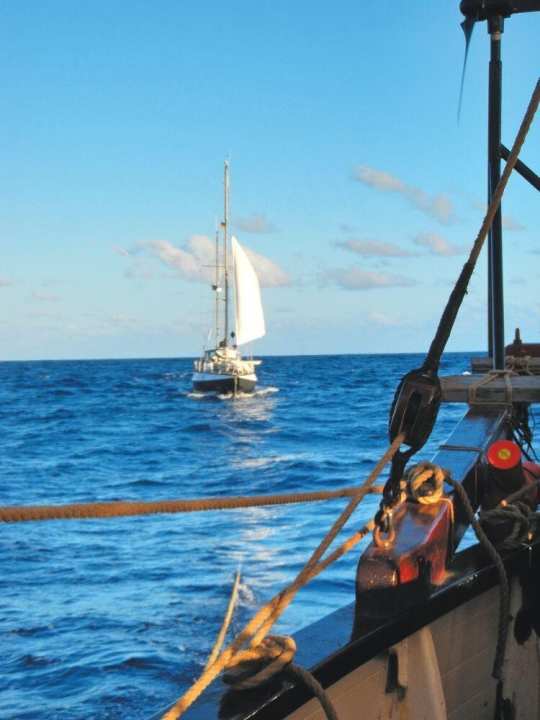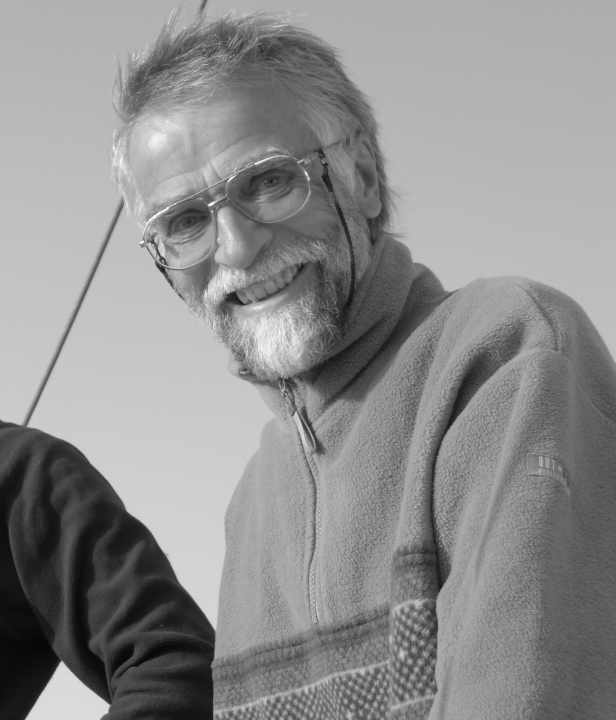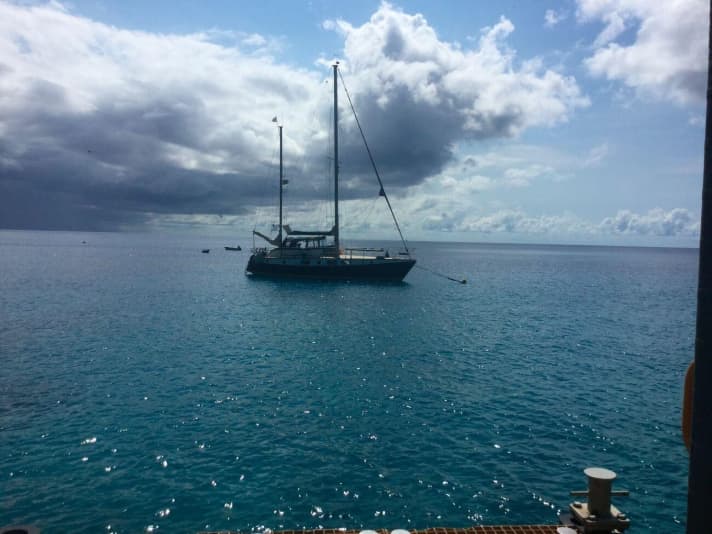
"This letter is a little difficult for me, it's a farewell to dreams and my beloved boat." So begins the email that single-handed sailor Moritz Herrmann sent to sailing friends and acquaintances at the weekend. The sentence suggests that nothing good, perhaps even the worst, will follow. And that's right, the 74-year-old circumnavigator, father of Germany's most famous ocean-going professional Boris Herrmann, describes in his letter how he got into such a desperate situation on the Indian Ocean with his steel ketch "Fidel" that he made an emergency call and had himself taken off. Before doing so, he opened the sea valves of his ship to sink it and prevent it from becoming an obstacle to shipping.
Over, out, over.
"Opening the sea valves was like murdering a good friend," says Moritz Herrmann about his last moments on board. "But there was nothing more I could do, and once I realised that, it was fine. I've been lucky so many times."
Right from the start, the Oldenburg man's planned circumnavigation of the globe was not under a good star. Herrmann had already lost his rudder on the Atlantic and was hooked by the cargo ship "Tres Hombres" in a remarkable rescue operation and towed to the Caribbean (YACHT 5/2013). But even after that, the hydraulics of the rudder continued to cause Herrmann problems.

Moritz Herrmann is now back in Germany, you can read his very emotional full-length report here:
"Dear friends of sailing!
This letter is a little difficult for me, it is a farewell to dreams and my beloved boat. Over the last few months, I have experienced many defeats: the hydraulics of the rudder system kept failing. In Bali, I decided to have the rudder rebuilt so that it turned more easily. The hydraulics were overhauled (again). So I set off for Christmas Island and the Cocos Islands with a good feeling and experienced happy sailing days in front of a steady south-easterly. A North Sea sailor can hardly imagine such luck, gliding along for days in warm temperatures, almost without operating the sails, in an expanse of sea that has no shallows here, 1000 nautical miles from any land. I found the most beautiful anchorage of my trip on the Cocos Islands, crystal clear water over white sand. Most of the sailors had turned northwards, with only a small group heading further west towards South Africa.
My next destination after Cocos was Rodrigues, an island that belongs to Mauritius. I had the best sailing days ever with 140 nm of sailing time and saw myself at my intermediate destination in about 10 days.
Then the new furling system broke out of the deck, hanging from the top of the mast, the heavy furling basket and the whole system with the sail flung far to leeward, then thundered against the boat again and again like a wrecking ball. A life-threatening struggle to catch the foot began. A particularly strong gust, supported by a heavy sea, whirled the system high over the mast to the windward side. I managed to catch it with a line and lash it to the railing. The sail tore so violently that the reefing pole pushed and pulled unpredictably and threatened to smash the windows in the side of the boat. But they came far under water with every roll ...
During this fight I was thrown back and forth several times, scraped across the deck with my back, but always managed to hold on to the railing, bleeding from my hands and feet, and even from my nose after a blow with the pole.

The next target was to tear up the headsail. It developed a tremendous amount of pressure on the top of the mast, which was no longer secured to the front. I tied a long aluminium tube to a sharp fishhook and tried to hack into the sail with this heavy thing. Of course, I couldn't stand free, I was repeatedly thrown out of my clamp on a shroud. At one point, I climbed onto the roof of the cake stand and before I could straighten up, a wave catapulted me downwards. Incredibly lucky, I didn't fall overboard, but into the passage between the superstructure and the railing. It was days before I had hacked the nerve-wracking rattling shreds of sail smaller.
Next step, a sheet had fallen into the water and wrapped itself around the propeller. I tried to dive, but the stern was rising and falling, threatening to knock me out. I pulled another line around the stern so that I could pull myself down and hold on to it when the boat dipped. I managed to release the line.
Now I could get back on course. This calmed the rolling a little and I dared to climb a bit into the mast to attach a block, through which I clipped a line to hoist a storm jib, finally I set the reefed mizzen sail and the boat actually sailed towards Rodrigues at three knots.
I breathed a sigh of relief and relaxed; okay, so I'd be travelling for another 20 days instead of 10. So what, I couldn't worry about that. I needed the engine regularly to generate power for the autopilot and it ran smoothly, as it always did after I discovered a fault with the exhibitor.
The elation again, looking out over the living, ever-moving expanse of the ocean, where you see the weather coming and going, behind you the sunrise, in front of you its setting. You have all this, the daily routine, the horizon view, the weather, the wind and the eternal sea to yourself, unobstructed by billboards, unclouded by sound and always fresh, savoury air; breathing is a pleasure.
During the night, the autopilot stopped working ... "Fidel" lurched across the sea again, rolling and tossing me back and forth. I turn the steering wheel vigorously, it's suspiciously easy, the boat doesn't react. I crawl to the aft peak and climb in: oil everywhere. The hydraulics are gone, all the seals are dripping. How can this be after all the repairs? I feel something breaking inside me: this is the end. No, I scream, don't make a decision now, wedge yourself into the bunk. Try to get some sleep first. I crawl into the foredeck and dig out the only can of beer I've taken with me. I tie myself up so I can drink and look out over the sea at night. You look so alive and beautiful, I think, but in the back of my mind the thought looms like a poisonous cloud: Moritz, you've lost.
The next morning I phoned Boris, my son, explained that I was ready to be picked up by a ship, gave him my position and asked him to notify the emergency control centre in Bremen, which passed the message on to Australia.

At first I was told that it would probably take a few days, the area was very deserted. But then I was suddenly told that a ship would be arriving in the next few hours. Its outline soon appeared on the horizon, I hurriedly shaved, washed up a bit and packed a few essentials. It was a huge ship coming from the north-east, as I found out later, 280 metres long and 40 metres wide. The captain slowly drew a circle around me, but he couldn't get near me. These colossi are not built for tight manoeuvres. It was getting dark, and I finally started my engine and drove abeam towards the "Pacific Spirit". What would happen? "Fidel" rammed against the high ship's side and then lay alongside, as if seeking shelter. A heavy line came from above, I was able to grab it, it was incredibly difficult to pull it to the bow and tug it through the hawsehole and finally over the cleats. A second line came from above. I tied on my small pieces of luggage and shouted upwards from the dark: Heave to! Cries of disappointment came from there: 'We don't want to save your luggage, we want to save your life! I had put on my oilskin and lifejacket to save this stuff too.
I had the handheld VHF device in my breast pocket, the captain shouted for me to come immediately, the crew shouted from above, but I still had a heavy duty to fulfil: I climbed down once more, cut a hose and opened the sea valve. That way, "Fidel" would sink and not endanger others as a ghost ship.
Another line came from above, with a lifebelt hanging from it, but I couldn't put it on, everything was twisted and my hands were flying. So I asked for a rope ladder. That came too. "Fidel" shot up and down the side of the boat and was repeatedly and cruelly smashed against the big one. I realised how strong my boat had been built, any wooden or plastic boat would have been smashed to pieces. The most incredible thing was that the mast was still standing, the spreaders had fallen next to me without hitting me, the mast could break at any time, and every time "Fidel" smashed against the high side of the boat, the crew up top screamed.
I now had to catch the rope ladder with both hands. To do this, I had to let go of "Fidel's" shroud. I was scared, sometimes "Fidel" was over a metre or more away from the side of the boat, sometimes he banged against it, and it always went up and down by the metre. The hard part was getting my feet on the ladder at lightning speed. Somehow I managed it. I climbed a few steps and felt my strength leave me, I was drenched in sweat and struggling to breathe. Looking up threatened to give me the rest - the side of the boat disappeared upwards into the darkness, all I could hear was the crew shouting, they were cheering me on!
The first part of the climb was the hardest. The ladder was hanging freely at the bottom of the collapsing part of the hull and was still turning. So the whole load was hanging on my arms. My hands tightened around the rope and I could hardly release them. Then I got to the area where the ladder rested against the vertical side of the ship, which made climbing easier. Finally, the crew was able to grab me from above and then I lay between them on deck, panting, saved. I pulled myself up, supported by many hands, and looked into friendly faces: "We were afraid for you, they kept saying. The "Pacific Spirit" is an all-Chinese ship belonging to a Chinese company.
From then on, I was fine. Chinese food is healthy and tastes good, I learnt to love Chinese tea and enjoy Chinese hospitality. The captain gave me two shirts and a white suit, had my hair cut because I had to look neat for the many photo shoots as the person they had rescued. The crew collected Chinese tea for me. They put milk, water and fruit in my room and kept asking what I wanted. The company that runs the ship changed course to Mauritius because that was the shortest flight home for me. They organised a launch to pick me up from the anchored ship and an agent to take care of the paperwork and arrange the onward flight. I spent the time until my departure with the German honorary consul in Mauritius, who also catered for me.
Well, now I'm looking for a flat and trying to make a fresh start. There's still a painful gap next to me: there's no more boat.
My son and his girlfriend and my long-time friend Ulla help me through the first few days in this new phase of my life.
Best wishes to you all, Moritz"

